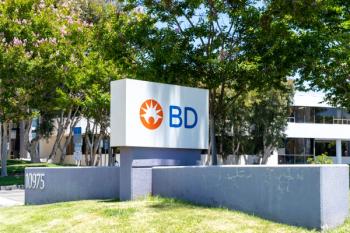
- The Column-05-06-2015
- Volume 11
- Issue 8
The 2015 LCGC Awards: Part 2
Since the founding of LCGC in 1983, we have made it our mission to serve the separation science community by publishing articles with a practical focus on improving chromatographic methods. Over the years, those articles have included many seminal works from leading analytical scientists who have made groundbreaking advances that have benefitted the entire community. This year, we are once again pleased to honour an outstanding chromatographer: Caroline West, the winner of the 2015 Emerging Leader in Chromatography Award. This year, we had the additional opportunity to honour West at Pittcon 2015 in an oral symposium as part of the Pittcon technical programme.
Since the founding of LCGC in 1983, we have made it our mission to serve the separation science community by publishing articles with a practical focus on improving chromatographic methods. Over the years, those articles have included many seminal works from leading analytical scientists who have made groundbreaking advances that have benefitted the entire community. Eight years ago, we decided to honour those leaders by establishing the LCGC Emerging Leader Award. The list of honorees is indeed an impressive one (Table 1). This year, we are once again pleased to honour an outstanding chromatographer: Caroline West, the winner of the 2015 Emerging Leader in Chromatography Award. This year, we had the additional opportunity to honour West at Pittcon 2015 in an oral symposium as part of the Pittcon technical programme.
LCGC’s 2015 Emerging Leader in Chromatography, Caroline West, received her degree as an Engineer in Chemistry from the National Superior School of Chemistry of Mulhouse (2002), a master’s degree in analytical chemistry from Paris VI University (2002), a doctoral degree in chemistry from Paris-Sud University (2005), and her Habilitation to Direct Research (Dr. Hab.) from the University of Orléans (2010). West originally began studying analytical chemistry because of an interest in forensics. However, after spending some time in a forensics laboratory working on the analysis of explosives residues, West realized she was more interested in the fundamentals of chromatography.
Before embarking on her impressive academic career, West spent a few years working in industrial and governmental laboratories. She spent one year at Kodak Limited R&D in Harrow, England, followed by work with the Laboratory of the Central Police in Paris in the explosives and fires division. In 2002, she moved into academia, working in the Laboratory for the Study of Techniques and Instruments of Molecular Analysis with the analytical chemistry group of South-Paris University at the Technical University Institute at Paris XI University. In 2005, West became an associate professor with the Institute of Organic and Analytical Chemistry (ICOA) at the University of Orléans, where she continues to work today. There, her work activity is shared between two teams: one focused on the extraction and analysis of bioactive molecules (under Professor Claire Elfakir) and another focused on chemo-informatics (under Professor Pascal Bonnet).
In addition to her research and teaching work, West is in charge of master’s studies in analytical chemistry as well as analytical chemistry seminars. She is also involved in activities connected with the laboratory’s external relations, such as “open-door” days and welcoming foreign visitors. West is an elected member of the Experts Committee in physical and analytical chemistry of the University of Orléans and the local section for the French Society of Chemistry (SCF). She is also a member of the French Society for Separation Science (AFSEP) and an active reviewer for several analytical chemistry journals, such as the Journal of Chromatography A and the Journal of Separation Science, where she reviews about 20 papers per year.
West has also supervised five doctoral students, five master’s students, and five undergraduate students. She gives lectures on analytical chemistry at the University of Orléans that average 200 hours per year; since 2006 she has also given lectures on chromatography in Poland for the joint French-Polish Chemistry degree between the University of Orléans and Jagiellonian University in Krakow, Poland.
Contributions to the Field
West’s research is focused on supercritical fluid chromatography (SFC), chromatographic columns, hydrophilic-interaction chromatography (HILIC), enantioselective chromatography, and chemometrics. Her work has been published in review journals 51 times, and she has also published a book chapter. West’s h-index is 16, with more than 700 external citations. She is also very active speaking at international and national conferences. West has received several awards such as the Best Young Scientist Award at the Chemometrics in Analytical Chemistry conference in 2012 and the Best Poster award at the SFC conference in 2012.
West is well known for her research in SFC. In a letter supporting West for the Emerging Leader award, Georges Guiochon noted that West developed a “remarkable classification” of the stationary phases used to pack columns for SFC and HPLC. This original, unified classification of separation phases showed that the implementation of SFC as a reversed-phase or normal-phase method depends only on the polarity of the stationary phase. “Then, the role of the organic modifier is essentially to enhance the solubility of the polar components of the sample and to modify the polarity of the stationary phase by absorbing on its active sites,” Guiochon wrote.
“I consider her work as the most important contribution made to the improvement of our knowledge of SFC separations made in the last 10 years,” Guiochon concluded. “It combines an excellent fundamental understanding of the thermodynamics of separations and a great practical usefulness.”
West began the classification project as her PhD thesis. She said the purpose of the thesis was to investigate the applicability of porous graphitic carbon (PGC) stationary phases in SFC, so she wanted to compare PGC to other stationary phases that are commonly used in SFC, and that led to building the classification system. “I believe that the major information we have gained from this work is that the diversity of selectivities that are available to the SFC chromatographer is extremely wide and strongly dependent on the stationary phase,” West said. “I hope it is helpful to those who are now getting acquainted with the technique, especially in the early steps of method development when a column must be selected.”
Yingru Zhang, a senior principal scientist at Bristol-Myers Squibb Co., agrees that West’s contributions to SFC have had a big impact. “West’s greatest contributions to the field are her pioneering work not only in the fundamental understanding, but also in advancing the applications of SFC for both chiral and achiral separations,” Zhang said. Zhang added that West is one of the most productive researchers in the field of SFC, where she “brilliantly, methodically extracts useful information from the enormous amount of experimental data she generates and provides insight into the very complex SFC chromatography process for enantiomeric separation.” Zhang added that West’s research provides an “excellent and valuable guideline to help scientists develop SFC methods.”
Bezhan Chankvetadze, a professor and the director of the Institute of Physical and Analytical Chemistry at the School of the Exact and Natural Sciences at Tbilisi State University and editor of the Journal of Pharmaceutical and Biomedical Analysis, concurred that West’s work in SFC is very significant. “I consider her contribution in reviving this very promising green separation technology as immense,” said Chankvetadze.
Pat Sandra, an emeritus professor at the Research Institute for Chromatography, credits West and Eric Lesellier for believing in and promoting SFC for many years. “Their input on the present state-of-the-art in SFC is great,” he said. “SFC has only been able to survive, and to gain its current momentum, thanks to scientists like West and Lesellier,” said Sandra.
Eric Francotte, an executive director at Novartis Institutes for BioMedical Research, also appreciates West’s work in SFC. “Her expansion of the application of SFC and more rational understanding of the fundamentals to the technique are her greatest contributions so far,” he said.
David McCalley, a professor of bioanalytical science in the Faculty of Health and Life Sciences at the University of the West of England, said that West’s wide experience in SFC resulted in an invitation from the editors to publish a chapter in the respected review series Advances in Chromatography in 2010. McCalley also brought up West’s contributions in HILIC. West investigated the retention behaviour of zwitterionic stationary phases, using a modified version of the solvation parameter model to account for the retention behaviour. “In this way it was possible to identify the different factors that contributed to the retention of these solutes in the HILIC mode,” said McCalley. “The approach in this work was novel, and included descriptors to account for anionic and cationic retention of the solutes.” McCalley also said that this work by West was useful in providing recommendations for practitioners obtaining the optimum separation of these compounds.
Michael Lämmerhofer, a professor for pharmaceutical bioanalysis at the Institute for Pharmaceutical Sciences at Eberhard Karls Universitat Tübingen, said he is an “independent witness” to West’s work because he continuously follows her work via her publications but has never collaborated with her directly. “West has published outstanding work in the field of analytical chemistry and chemo-informatics,” he said. Lämmerhofer also appreciates the systematic way in which West looks at chromatographic separations and the resultant data. “The methods she uses transform data into illustrative information about mechanisms in chromatography,” Lämmerhofer said. He added that he uses some of her key publications in his teaching and short courses on chiral separations. “It is my opinion that the vast majority of the results of Dr. West’s studies have significantly impacted the field and, thus, have been widely cited,” he concluded.
West is also noted for her great teaching skills. Zhang says that West is an excellent professor who really cares about her students. “For example, she has actively looked for and obtained internship opportunities for her students in the pharmaceutical industry,” said Zhang.
Lindner also attested to West’s teaching and lecturing skills. When he first met West at the 2010 HPLC conference in Boston, Lindner immediately “recognized West as a very talented and motivated speaker, particularly on SFC”. Later, when he was organizing a panel discussion on the potential of SFC, he invited West as an “emerging expert” working in academia. He also invited West to give a tutorial lecture on SFC that was very well attended.
Lindner mentioned that West’s efforts to get SFC technology more strongly established in the academic environment are also important because the technique has historically been more popular in industry. “To teach SFC to students is important in order to have them familiarized with the peculiarities and the differences of SFC compared to the well-established reversed-phase HPLC techniques and others,” Lindner said. He added West is an excellent lecturer and teacher with “great potential to become a leader in the field.”
“West is open-minded, flexible in many respects, and can work in an interdisciplinary fashion, which is essential in a modern research scenario,” said Lindner.
Chankvetadze agreed with Lindner’s assessment. “I believe she is definitely heading to soon become one of the global leaders in the field of separation science.”
Meg L’Heureux is the Managing Editor of LCGC North America.
Articles in this issue
over 10 years ago
Novel Strategies for Biopharmaceutical Purificationover 10 years ago
Markes International Wins Queen’s Award for Enterpriseover 10 years ago
Analyzing Shipwrecked Beer from 1840s Using GC–MSover 10 years ago
Vol 11 No 8 The Column May 06, 2015 Europe and Asia PDFover 10 years ago
Vol 11 No 8 The Column May 06, 2015 North American PDFNewsletter
Join the global community of analytical scientists who trust LCGC for insights on the latest techniques, trends, and expert solutions in chromatography.




